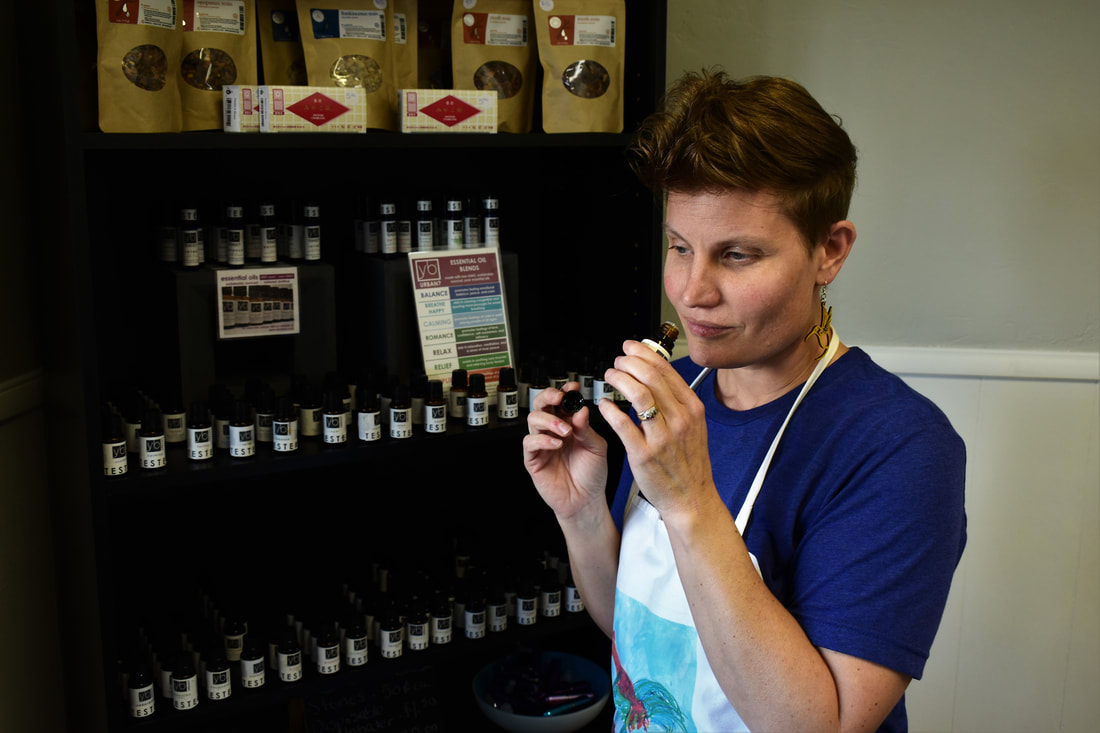"Anytime we come to the breath, simply to notice it's happening, we are present. The longer we stay with the breath, the deeper the breath becomes. We are calm."
Our breath is our anchor to remaining present in our activities. Too often we are coming and going one place to the next, but our mind is elsewhere. Think about the last time you were driving somewhere and all of the sudden you realize you're 2 miles ahead of the last time you were just driving. It can actually scare me at times how much time I lose to runaway thoughts that steal me away from the experience at hand. Our breath comes and goes without thought, it's automatic, it doesn't require us to notice it or consciously engage in the act of inhaling and exhaling. Our body knows what to do, so we can carry on with our busy minds, without fear of missing a breath, or a heartbeat. But if we only knew how much healing can come from simply listening to ourselves breathe, we might approach things a little differently.
The Missing Link to Meditation
A few months into the pandemic, l, like many of you, found myself with a little more time on my hands. Before that time, I was driving thirty minutes 3-4 times a week in the morning to teach yoga and Pilates classes. Once I stopped doing that, I noticed I had more time in the morning to myself. I had tried meditating in the past but got so frustrated by my inability to quiet my overactive mind, that I always gave up quickly. I decided this was how I was going to use my newly acquired mornings. I have had a committed meditation practice for years now, and not only does it no longer frustrate me, but I also look forward to it and it has changed my life.
The key to overcoming the frustrations of meditation is the breath. Anytime we come to the breath, simply to notice it's happening, we are present. The longer we stay with the breath, the deeper the breath becomes. We are calm. The moments spent simply feeling, listening to, and engaging the breath are moments we are no longer engaging with the stories our minds are telling us. It's these stories we tell ourselves about who we are, who others are, who others think we are (that are more often false than true) that cause great suffering for humans. We first think of these stories, then we engage them and start to believe them, and finally we feel the need to act on them. What if in those moments of thought we could simply watch them pass by, understanding that our mind is always active, but we can be still and present. This is the gift of the breath. This is the link to creating a successful meditation practice.
The Breath and Aromatherapy
Let's get a little science-y! Because the breath is how we smell, and essential are made up of all the plant chemicals that give that plant it's unique aroma, breathing and aromatherapy go hand-in-hand. The scientific term for "smell" is olfaction. The basic idea of olfaction is that every aroma is made up of molecules (or chemical components) just like essential oils are. These molecules have a unique and specific shape, like a key. Inside our nose we have a smelling apparatus that acts like a net to "catch" the molecules. There are approximately 50 million receptors that live within less than 1 square inch of what is known as our olfactory membrane. It's these receptors that receive the molecules and each "key" fits perfectly into a receptor which unlocks the opportunity for your brain to interpret the scent. The transmission of this information is almost instantaneous to the nervous system.
In the brain, the olfactory system connects with both the cerebral cortex (conscious processing, discernment, and recognition) and the limbic region of this cortex (emotion, instinctive behavior, motivation, drive, feelings, learning, and memory). Because of this colse connection to the limbic region, we can start to see why essential oils are used so widely for adapting behaviors related to anxiety, over-thinking, addiction, attention disorders, trauma, and memory loss. We might also begin to see how we can use them to help us trough times of emotional stress, sadness, grief, anger, and self-doubt. It all begins on the breath.
The Last Breath
Watching a conscious, living, breathing being take their last breath is a profound experience. I have only experienced this once, with a young cat we had on our farm named Wilbur. Wilbur was born on our farm to Jennie-fur, one of our sweet female calicos. Jennie had 5 kittens born on the fifth of May. Four of them were orange and white short-haired males. Wilbur was a gray and white male with long hair. Our of the litter, he was the most unique, and one of 2 that we kept, while the others were adopted out as house cats. Nothing seemed odd or unusual about Wilbur. He survived his first winter with no issues, and, by the time his first birthday came along that spring, my only concern was that his long hair was getting matted together as he shed his winter coat, something I would never have considered as we always have had short haired barn cats. I felt bad for the little guy, wondering if his life would have been easier in that moment as someone's house cat.
As fall rolled around, I noticed Wilbur becoming lethargic, having trouble walking, and losing weight, except for in his newly bulging belly. Suspecting worms, I treated him and the rest of the cats. When that didn't help, I brought him to the vet where I received the worst possible news, she believed the expansion in his mid-section was due to a tumor. She gave us the option of having tests to determine the exact nature of the mass, but frankly told me there was likely nothing that could be done and the tests would be very expensive. I opted instead to bring him home, make him comfortable in the house, and keep an eye on him for signs that he was suffering too much to keep going. It happened one morning in September. Chris came downstairs to find him in his kennel, crying out in pain. When he opened the door, Wilbur could barely crawl out and wouldn't eat or drink for the first time. With every move he made, he would release a sharp-pitched scream, we could tell he was ready to go. We made a plan to call the vet out that day and humanely put him down, but before I could even make the call, Wilbur took his last breath on our dining room floor. The moment he inhaled for the final time, I knew it was his last, and we watched the life quickly leave his little body as we pet him and told him he was safe and loved. I can only imagine the same experience with a person would be so much more intense, because that moment was one I will never forget. From watching my babies take their first breath in the outside world to watching our kitty take his last, the breath is nothing short of the miracle of life itself.


 RSS Feed
RSS Feed